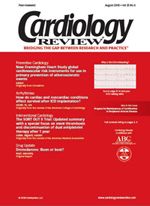Publication
Article
Cardiology Review® Online
Getting to the heart of women's cardiovascular disease
Author(s):
Given its status as the number one killer of American women, we're now highlighting women's cardiovascular health with more frequent coverage and a new subject category titled "In the Heart of Women." In the inaugural paper under this heading, Drs Joline W.J. Beulens and Yvonne T. van der Schouw from the Netherlands asked the question "Does both a high dietary glycemic load and high glycemic index increase the risk of cardiovascular disease among middle-aged women?" A prospective cohort of 15,714 Dutch women aged 49 to 70 years was studied and the results confirmed their hypothesis. As I note in my commentary, this should make us wary of the safety of high-carbohydrate diets. In the Images in Cardiology section, Drs Khalil A. Kaid and Marc Cohen report a case of simultaneous "double" myocardial infarction and provide interesting illustrations to confirm their hypothesis. Once again, we encourage readers to participate with this imaging feature, sending well-written case studies and revealing images along to the editorial offices. Full
are available on this website. In the Stroke and Arrhythmias section, Dr Albert Yuh-Jer Shen and associates assessed racial and ethnic differences related to the risk of intracranial hemorrhages in 18,867 patients with nonrheumatic atrial fibrillation. In general, nonwhites were at greater risk for warfarin-related intracranial hemorrhages. Dr Douglas Dulli, our neurological consultant, offers his views on the clinical importance of this study. An article in the Lipid Disorders section by Dr Scott Kinlay evaluates the contribution of therapies that lower low-density lipoprotein cholesterol (LDL-C) to changes in C-reactive protein (CRP; a nonspecific indicator of inflammation). The author conducted a meta-analysis of 23 studies and concluded that most of the anti-inflammatory effects of statins were related to the magnitude of LDL-C reduction. Do we really need CRP to tell us this? In his commentary, Dr Ira J. Goldberg muses on this question, and advises lowering LDL-C regardless of the CRP. The issue is topped off with news coverage of breaking research from other publications, and more preparatory questions for the Maintenance of Certification in Cardiovascular Disease exam.
—Peter F. Cohn






